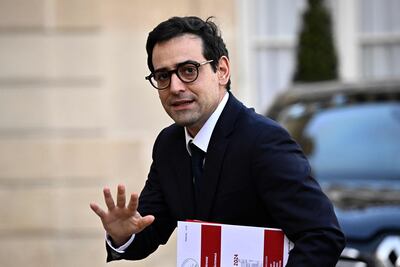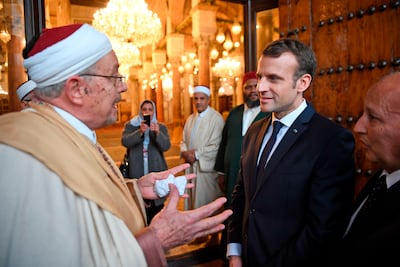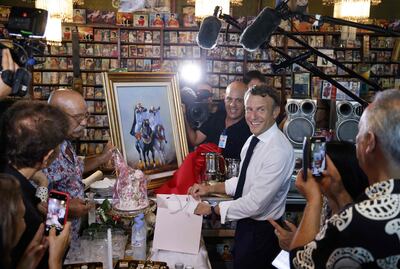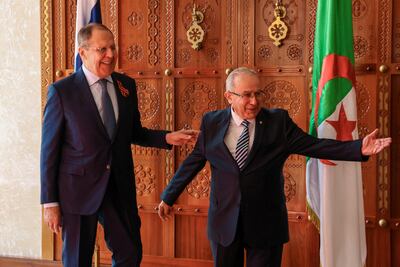Analysts say that tensions between France and North African nations are creating opportunities for other global players like Russia and China to establish their influence in this strategically located and resource-rich region.
The latest issue centres on France’s appointment of the new Foreign Minister, Stephane Sejourne, who, as a member of the European Parliament (MEP) angered Morocco by accusing Rabat of corruption and human rights abuse.
The appointment follows a series of diplomatic stumbles that have also strained relations with Algeria and Tunisia, risking a decline in the influence of the former colonial power, which has been historically the major player in the Maghreb.
There is also mounting anger at France's perceived support for Israel’s war in Gaza, which has killed more than 25,700 Palestinians.
"France's relations with Morocco have been apathetic for a while now, this status quo is getting more engraved with the newly appointed government and its Prime Minister (Gabriel Attal), who does not have any known friendly positions towards Morocco," Mohamed Bououd, a Tunisian political analyst, told The National.
The recent decision to bring in Mr Sejourne immediately stirred debate among Moroccan media outlets and online.

The former adviser to President Emmanuel Macron used to be the leader of the European parliamentary bloc Renew Europe, which was responsible for pushing for the adoption of two resolutions that angered Rabat.
The first condemned alleged breaches of freedom of expression following the jailing of Moroccan independent investigative journalist Omar Radi, who was sentenced to six years in prison for espionage and rape. Renew Europe accused Moroccan authorities of fabricating evidence and persecuting Mr Radi for exposing corruption in officialdom.
The second featured a decision “to treat Morocco on the same basis as Qatar”, referring to accusations of the small Gulf state bribing MEPs and creating a lobbying network to influence the European Parliament. The Moroccan government has been implicated in the case, accused of offering Italian former MEP Pier Antonio Panzeri bribes and secret payments in return for him putting forward pro-Moroccan requests to the Parliament.
These resolutions – mainly orchestrated by Mr Sejourne – led to the deterioration of relations between the two countries.
According to Mohamed Zakaria Abou Dhahab, professor of international studies at Rabat's Mohamed V University, these resolutions were perceived as an attempt by Paris “to strike Morocco's interests”.
"There's a cautious apprehension at the moment as to how bilateral [Moroccan-French] relations will turn out with this new government and the ongoing Macron second mandate,” he added.

Since ascending to power as Algerian president in 2019, Algeria’s President Abdelmajid Tebboune has called on France to apologise for its past colonial presence, which remains a source of recurring tensions.
France colonised Algeria for 132 years (1830-1962), leading to wars and conflicts that caused the deaths of between 500,000 and one million Algerians.
However, Algeria’s request for an apology and potential reparation has been met coldly by Mr Macron.
“You do not have to ask for forgiveness. This is not the goal. The word [apology] will sever all ties,” Mr Macron told Algerian writer Kamel Daoud in an interview published by Le Point magazine.
Algeria is seeking to expunge French influence in its educational system, which dates back to the colonial period, and introduce English into primary school curriculums, in universities and some secondary schools.
Meanwhile, in Tunisia's baccalaureate national exam – the national end-of-high-school certificate – a growing number of pupils (most recently about 7,000) are failing their French exam each year, while acquiring the best marks in English.
During the summit of francophone countries, which was hosted by Tunisia on the island of Djerba in November 2022, President Macron admitted the status of the French language was suffering setbacks throughout the Maghreb.
Since Tunisian President Kais Saied's consolidation of power in 2021, Tunis has repeatedly accused the EU of attempting to meddle in its internal affairs.
This risk in Tunisia for France has loomed large after the visit from Chinese Foreign Minister Wang Yi last week and Russian FM Sergey Lavrov last month.
"The partnership with France is no longer tempting with the new powers that are sweeping into the region," Mr Bououd says.

Seeking alternative allies
After years of dependence on France and other European partners for economic aid and investment, developments have made these countries seek alternative allies.
China is looking for opportunities, with Belt and Road infrastructure promises and its potential involvement in projects such as the University Hospital of Sfax and the Melegue Dam near El Kef.
Russia has also shown growing interest in Tunisia, with high-level diplomatic meetings and promises of more wheat shipments to alleviate a food crisis, in part caused by the Ukraine war. President Vladimir Putin told Russian media in December Moscow was "preparing agreements on a free-trade area with Egypt, Morocco, Tunisia and Algeria. It’s all of North Africa."
Algeria's ties with Russia have always been strong, stemming from the Soviet Union's support for the country during its war of independence. Those ties have grown stronger since the war in Ukraine, with the two countries signing a strategic partnership pact in June after President Tebboune's visit to the Kremlin.
Russia and Algeria held joint naval drills in the western Mediterranean in December. Meanwhile, China is investing heavily in El Hamdania port and is investing increasingly in Algeria's energy sector.

Algeria has faced criticism from the West, with members of the US Senate calling for sanctions on the North African country over its $7 billion purchase of weapons from Russia in 2021. In November 2022, MEPs urged European Commission President Ursula von der Leyen to review the bloc's 2005 Association Agreement with Algeria over "deep concerns at Algeria's close political and economic ties with Russia".
For its part, Morocco has turned towards Spain and Portugal. It has also been expanding its partnerships through deals such as a free-trade agreement with the US in 2004, a fishing agreement with Russia in 2021, and the Belt and Road Initiative Joint Implementation Plan with China in 2022.
"Morocco is aware that it is very risky to make its interests the hostage of a sole partner," said Mr Abou Dhahab.
"Morocco knows that it is in its interests to have relations with countries that are influential in international decision-making."
On top of economic reasons, increasing Schengen visa restrictions, hindering the travel of many people from the Maghreb to France, is viewed as a reason for the deterioration of relations.
In September 2021, France reduced the quota for visas granted to Algerians and Moroccans to 50 percent and for Tunisians to 30 percent. Travelling to the EU, especially France, is becoming harder.


